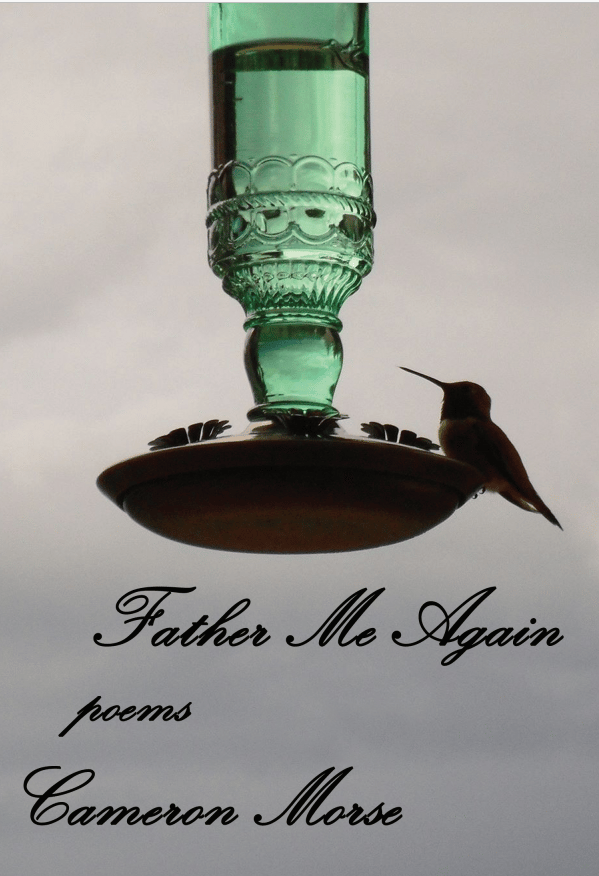
Father Me Again
$10.00 - On sale
Father Me Again explores the bittersweet complications of being simultaneously an expectant father and a glioblastoma patient, which is itself a contrary kind of expectancy. Stretched between diametric life events, oscillating between oncology treatments and prenatal care appointments, Cameron Morse has no option but to grapple with the dark side of hope, to flail in a preternatural web of uncertainty, and to ultimately find redemption by learning to ‘Sing and singe in the threadbare seam / between being and being gone.’ This book will have you thanking it for breaking your heart.
—Jessica Goodfellow, author of Whiteout.
Cameron Morse deftly handles the big themes—birth, love, mortality—and well knows “the thumb of God” pressing down on him; but these poems grow in stature and distinction by elevating seemingly mundane details of life. Instead of listening only, and merely, to God’s voice in the wind, Morse says, “I hear / a hiss in the oak leaves / like rice pouring into an empty pot.” Such stunning imagery allows us readers to live more intensely. The generational vitality that celebrates a new son and laments a missing father, for example, finds language that is both human and steady: “But Dad,” says the poet, “If you aren’t / coming, I will take your place.” Cameron Morse is a gifted poet, whose poems are a gift to the rest of us.
—Robert Stewart, author of Working Class.
Cameron Morse’s Father Me Again is, yes, a meditation on earthly and heavenly fathers and sons, but it is also an in-the-moment journal of the poet’s encounter with brain cancer. Poems in this collection are carefully crafted; imagery is one of the poet’s special gifts. Despite—or, perhaps, in service to—his preternatural themes, Morse’s poems most often begin in the quotidian, “The interstate tosses / in its rocky bed, all the contrivances / of man. Oak leaves choke / the storm drain. No one is coming / to clean up the mess”—and, almost always confront spiritual, personal and familial quandaries. Father Me Again is an extraordinary, honest reckoning of the human condition.
—Jeanetta Calhoun Mish, 2017-18 Oklahoma State Poet Laureate,
author of What I Learned at the War
These are remarkable poems, as brave as poems can ever be. Their hallmark is their balanced sensitivity and strength, each rendered with such clarity as to make each poem a singular achievement. They chronicle what Morse calls “this narrow life,” this transition we all are making between life and death, but which he sees with an intensity few of us will ever know. His life is peopled with an absent father, an extraordinary wife, a beloved son, and all the host of heavens that is the natural world, which he sees fiercely, fully, as “strings of geese draped overhead like prayer beads,” and as he vows courageously to “sing and singe in the threadbare seam between being and being gone.” He knows his life is not his own, and yet it is, when he reaches to hold his wife’s hand, when his son’s eyes meet his and are his, and when his son says “Oh,” when Morse is reading to him and they both fill up with perfect joy. Readers of these poems will react the same way and fill with that same understanding.
—John Hodgen, author of Grace.
Cameron Morse is poet, like Rilke, who writes so widely and alertly in the midst of our mortal panorama—not around it, or in spite of it, or approximately near it: “Sing and singe in the threadbare seam between being and being gone.” These are poems that confront both time and timelessness, until these states merge into one unified pitch of nearness and nowness and here. Morse’s poems demonstrate intimacy’s élan vital of interdependence and spaciousness, and he knows that to live one must remain continually intimate, so as to unify one’s hidden inwardness with the outward, exquisite field of the world. To do this, which so many of us fail to do, is what’s otherwise known as love.
—Jordan Stempleman, author of Wallop.
If everything in Father Me Again is bereaved and estranged, it is also newborn. When Morse “speaks” his “shriek,” he does so “among the living,” and he does not muzzle his wonderment. What a joy to stumble headlong into poems of such equipoise, what anguish, what solace.
—L. S. Klatt, The Wilderness After Which.